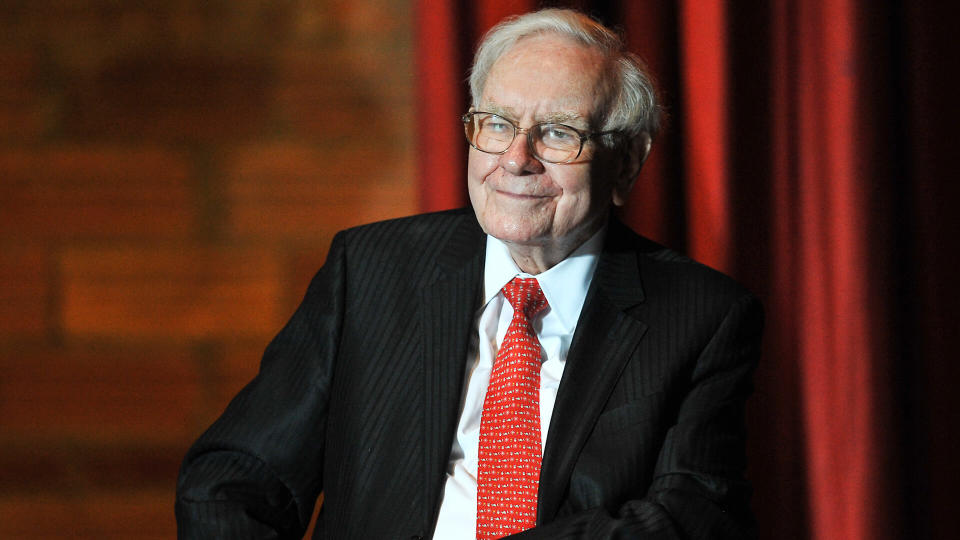Warren Buffett on the Myth of More: Why Too Many Stocks Can Lead to Downfall

When Warren Buffett gives financial advice, the world listens. The Berkshire Hathaway CEO and billionaire investor has some advice on buying stocks that might seem to go against the grain.
He’s been quoted as saying, “Diversification is protection against ignorance…It makes little sense if you know what you are doing.”
I’m a Financial Advisor: These 5 Index Funds Are All You Really Need
Know: 3 Things You Must Do When Your Savings Reach $50,000
Experts often interpret Buffett’s quotes to mean that buying too many stocks is not necessarily a sound investment strategy. However, as GOBankingRates has previously reported, Buffett has also recommended that investors buy big companies through the S&P 500. This can be construed as a form of diversification, but one that concentrates the investment in funds that have banked on top performers.
So what is his true take on buying a lot of stocks? Let’s explore.
Sponsored: Owe the IRS $10K or more? Schedule a FREE consultation to see if you qualify for tax relief.
Invest in a Small, Sound Number
Asher Rogovy, chief investment officer of Magnifina, an SEC registered investment advisor, pointed out, “The greatest long-term investors like Buffett made their fortune from holding a few top stocks rather than trading in and out of hundreds.”
He’s found that 20 to 30 stocks is usually plenty “to diversify against idiosyncratic risks from individual positions.”
He added that passive investing with index funds may be popular these days, but they hold too many funds and suffer from over-diversification — something advisors rarely talk about.
“Diversifying is an easy way to reduce risk but makes it difficult to maintain profitability. At any given time, there are less than a few dozen outstanding stocks, and most investors wouldn’t be able to identify even half of them,” Rogovy said.
Instead, he recommended just five great stocks that can compose a sizable core of a portfolio.
Read: How Much Monthly Income Could You Get From a $100,000 Annuity?
You’re Not Likely To Know How To Pick Them
Another reason not to buy too many stocks is that very few people, including professional money managers, truly know how to select successful individual stocks, according to R.J. Weiss, a CFP and CEO of the personal finance site The Ways to Wealth.
“Many studies have shown that even paid professionals often underperform compared to index funds in the long term. This underperformance suggests that for most investors, diversification through index funds is a more reliable strategy than trying to pick individual winners.”
Small Number of Stocks Brings the Most Returns
“An interesting study done by Arizona State University professor Hendrick Bessembinder shows that a small number of stocks have historically accounted for the vast majority of market returns,” said Robert R. Johnson, professor of finance at the Heider College of Business, Creighton University.
He shared this compelling statistic: “The study assesses compound returns to over 64,000 global common stocks from 1991 to 2020, showing that the majority, 55.2% of U.S. stocks and 57.4% of non-U.S. stocks, underperform one-month U.S. Treasury bills over the full sample.
Further, the top-performing 2.4% of firms account for the $75.7 trillion in net global stock market wealth creation during the thirty-year period. “In other words, the returns on the market have been driven by a small percentage of big winners. Trying to pick winners, for most, is a loser’s game,” Johnson said.
S&P 500 May Be Enough
Despite Buffett’s talk of “diworsification,” as Johnson put it, he said Buffett has also advocated for investors to essentially “buy the market” when building retirement savings.
Johnson shared that in his 2014 letter to Berkshire Hathaway shareholders, Buffett said that when he passes away, the instructions for the trustee for his wife will be to put 10% of the cash in short-term government bonds and 90% in a very low-cost S&P 500 index fund.
“In my opinion, Buffett’s message on diworsification is aimed at the active investment management industry that is built on the assumption that it can beat the market, yet diversifies so much that it becomes the market,” Johnson said.
However, the average investor won’t lose by investing in the S&P 500.
Johnson cited data from Ibbotson Associates that shows from 1926 through 2022, the average annual return on a large capitalization stock index like the think S&P 500 is 10.1%, while investments in long term government, long-term corporate bonds and Treasury Bills have on average grown annually by 5.2%, 5.7%, and 3.2%, respectively.
Unfortunately, the stock market doesn’t go straight up. He explained, “There can be extended periods of underperformance. For example, the decade of the 2000s actually saw a negative return to the S&P 500.”
Translation: investing is something best done for the long haul.
Investing Should Be Goal-Oriented
While buying stocks can feel like a game at times, it shouldn’t be treated as one, Weiss suggested.
Weiss suggested, “For most people, investing is about securing their financial future, particularly for retirement. Retirement investing should be goal-oriented and focused on long-term stability rather than trying to outperform the market.”
Therefore, betting on a bunch on a bunch of stocks won’t necessarily bring you the return you hope for.
More From GOBankingRates
Check Your Finances: You Might Be Making One of These Extremely Common Mistakes
6 Signs You're More Financially Savvy Than the Average American
This article originally appeared on GOBankingRates.com: Warren Buffett on the Myth of More: Why Too Many Stocks Can Lead to Downfall

 Yahoo Finance
Yahoo Finance 